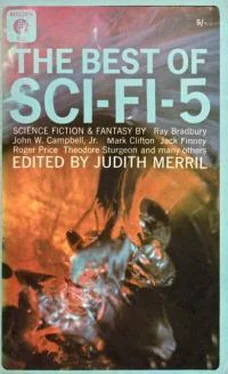The Best of Sci-Fi-5
Здесь есть возможность читать онлайн «The Best of Sci-Fi-5» весь текст электронной книги совершенно бесплатно (целиком полную версию без сокращений). В некоторых случаях можно слушать аудио, скачать через торрент в формате fb2 и присутствует краткое содержание. Год выпуска: 1966, Издательство: Mayflower-Dell, Жанр: Фантастика и фэнтези, на английском языке. Описание произведения, (предисловие) а так же отзывы посетителей доступны на портале библиотеки ЛибКат.
- Название:The Best of Sci-Fi-5
- Автор:
- Издательство:Mayflower-Dell
- Жанр:
- Год:1966
- ISBN:нет данных
- Рейтинг книги:3 / 5. Голосов: 1
-
Избранное:Добавить в избранное
- Отзывы:
-
Ваша оценка:
- 60
- 1
- 2
- 3
- 4
- 5
The Best of Sci-Fi-5: краткое содержание, описание и аннотация
Предлагаем к чтению аннотацию, описание, краткое содержание или предисловие (зависит от того, что написал сам автор книги «The Best of Sci-Fi-5»). Если вы не нашли необходимую информацию о книге — напишите в комментариях, мы постараемся отыскать её.
The Best of Sci-Fi-5 — читать онлайн бесплатно полную книгу (весь текст) целиком
Ниже представлен текст книги, разбитый по страницам. Система сохранения места последней прочитанной страницы, позволяет с удобством читать онлайн бесплатно книгу «The Best of Sci-Fi-5», без необходимости каждый раз заново искать на чём Вы остановились. Поставьте закладку, и сможете в любой момент перейти на страницу, на которой закончили чтение.
Интервал:
Закладка:
The senator looked a little surprised. “Why? We’ve convinced other scientists that they were mistaken in their observations. Why not Ch’ien?”
“Ch’ien is too good a scientist,” Candron said. “He’s not the type who would refuse to believe something he saw simply because it didn’t agree with his theories. Ch’ien is one of those dangerous in-betweens. He’s too brilliant to be allowed to go to waste, and, at the same time, too rigid to change his manner of thinking. If he had seen me teleport or levitate, he wouldn’t reject it—he’d try to explain it. And that would have effectively ruined him.”
“Ruined him?” The senator looked a little puzzled.
Taggert raised his heavy head from the couch. “Sure, Leo,” he said to the senator. “Don’t you see? We need Ch’ien on this interstellar project. He absolutely must dope out the answer somehow, and no one else can do it as quickly.”
“With the previous information,” the senator said, “we would have been able to continue.”
“Yeah?” Taggert said, sitting up. “Has anyone been able to dope out Fermat’s Last Theorem without Fermat? No. So why ruin Ch’ien?”
“It would ruin him,” Candron broke in, before the senator could speak. “If he saw, beyond any shadow of a doubt, that levitation and teleportation were possible, he would have accepted his own senses as usable data on definite phenomena. But, limited as he is by his scientific outlook, he would have tried to evolve a scientific theory to explain what he saw. What else could a scientist do ?”
Senator Kerotski nodded, and his nod said: “I see. He would have diverted his attention from the field of the interstellar drive to the field of psionics. And he would have wasted years trying to explain an inherently nonlogical area of knowledge by logical means.”
“That’s right,” Candron said. “We would have set him off on a wild goose chase, trying to solve the problems of psionics by the scientific, the logical, method. We would have presented him with an unsolvable problem.”
Taggert patted his knees. “We would have given him a problem that he could not solve with the methodology at hand. It would be as though we had proved to an ancient Greek philosopher that the cube could be doubled, and then allowed him to waste his life trying to do it with a straight-edge and compass.”
“We know Ch’ien’s psychological pattern,” Candron continued. “He’s not capable of admitting that there is any other thought pattern than the logical. He would try to solve the problems of psionics by logical methods, and would waste the rest of his life trying to do the impossible.”
The senator stroked his chin. “That’s clear,” he said at last. “Well, it was worth a cracked jaw to save him. We’ve given him a perfectly logical explanation of his rescue and, simultaneously, we’ve put the Chinese government into absolute confusion. They have no idea of how you got out of there, Candron.”
“That’s not as important as saving Ch’ien,” Candron said.
“No,” the senator said quickly, “of course not. After all, the Secretary of Research needs Dr. Ch’ien—the man’s important.”
Spencer Candron smiled. “I agree. He’s practically indispensable—as much as a man can be.”
“He’s the Secretary’s right hand man,” said Taggert firmly.
THE SOUND SWEEP
by J. G. Ballard
from Science Fantasy
It was Fletcher Pratt who first brought to my attention the use of fantasy, or more specifically of the fantastic or science-fictional environment, to spotlight or enlarge human reactions: “The intensification of emotion,” he called it. Very often, this is the main function of a fantastic backdrop: to set the stage for a close-up view of an emotional interchange which, under “normal,” “realistic” circumstances occurs at such low intensity as to be almost imperceptible; or to magnify a “normal” experience of the “real” world to, for example, Faustian proportion.
J. G. Ballard, one of the young British writers whose work has been much too little seen in this country, here provides an example of this sort of emotional intensification performed on a (literal) future stage-set of the past.
1
By midnight Madame Gioconda’s headache had become intense. All day the derelict walls and ceiling of the sound stage had reverberated with the endless din of traffic accelerating across the mid-town flyover which arched fifty feet above the studio’s roof, a frenzied hypomaniac babel of jostling horns, shrilling tires, plunging brakes and engines that hammered down the empty corridors and stairways to the sound stage on the second floor, making the faded air feel leaden and angry.
Exhausting but at least impersonal, these sounds Madame Gioconda could bear. At dusk, however, when the flyover quietened, they were overlaid by the mysterious clapping of her phantoms, the sourceless applause that rustled down onto the stage from the darkness around her, at first a few scattered ripples from the front rows that soon spread to the entire auditorium, mounting to a tumultuous ovation in which she suddenly detected a note of sarcasm, a single shout of derision that drove a spear of pain through her forehead, followed by an uproar of boos and catcalls that filled the tortured air, driving her away toward her couch where she lay gasping helplessly until Mangon arrived at midnight, hurrying onto the stage with his sonovac.
Understanding her, he first concentrated on sweeping the walls and ceiling clean, draining away the heavy depressing underlayer of traffic noises. Carefully he ran the long snout of the sonovac over the ancient scenic flats (relics of her previous roles at the Metropolitan Opera House) which screened-in Madame Gioconda’s makeshift home—the great collapsing Byzantine bed ( Othello ) mounted against the microphone turret; the huge framed mirrors with their peeling silverscreen ( Orpheus ) stacked in one corner by the bandstand; the stove ( Trovatore ) set up on the program director’s podium; the gilt-trimmed dressing table and wardrobe ( Figaro ) stuffed with newspaper and magazine cuttings. He swept them methodically, moving the sonovac’s nozzle in long strokes, drawing out the dead residues of sound that had accumulated during the day.
By the time he finished the air was clear again, the atmosphere lightened, its overtones of fatigue and irritation dissipated. Gradually Madame Gioconda recovered. Sitting up weakly, she smiled wanly at Mangon. Mangon grinned back encouragingly, slipped the kettle onto the stove for Russian tea, sweetened by the usual phenobarbitone chaser, switched off the sonovac and indicated to her that he was going outside to empty it.
Down in the alley behind the studio he clipped the sonovac onto the intake manifold of the sound truck. The vacuum drained in a few seconds, but he waited a discretionary two or three minutes before returning, keeping up the pretense that Madame Gioconda’s phantom audience was real. Of course the cylinder was always empty, containing only the usual daily detritus—the sounds of a door slam, a partition collapsing somewhere or the kettle whistling, a grunt or two, and later, when the headaches began, Madame Gioconda’s pitiful moanings. The riotous applause, that would have lifted the roof off the Met, let alone a small radio station, the jeers and hoots of derision were, he knew, quite imaginary, figments of Madame Gioconda’s world of fantasy, phantoms from the past of a once great prima donna who had been dropped by her public and had retreated in her imagination, each evening conjuring up a blissful dream of being once again applauded by a full house at the Metropolitan, a dream that guilt and resentment turned sour by midnight, inverting it into a nightmare of fiasco and failure.
Читать дальшеИнтервал:
Закладка:
Похожие книги на «The Best of Sci-Fi-5»
Представляем Вашему вниманию похожие книги на «The Best of Sci-Fi-5» списком для выбора. Мы отобрали схожую по названию и смыслу литературу в надежде предоставить читателям больше вариантов отыскать новые, интересные, ещё непрочитанные произведения.
Обсуждение, отзывы о книге «The Best of Sci-Fi-5» и просто собственные мнения читателей. Оставьте ваши комментарии, напишите, что Вы думаете о произведении, его смысле или главных героях. Укажите что конкретно понравилось, а что нет, и почему Вы так считаете.












